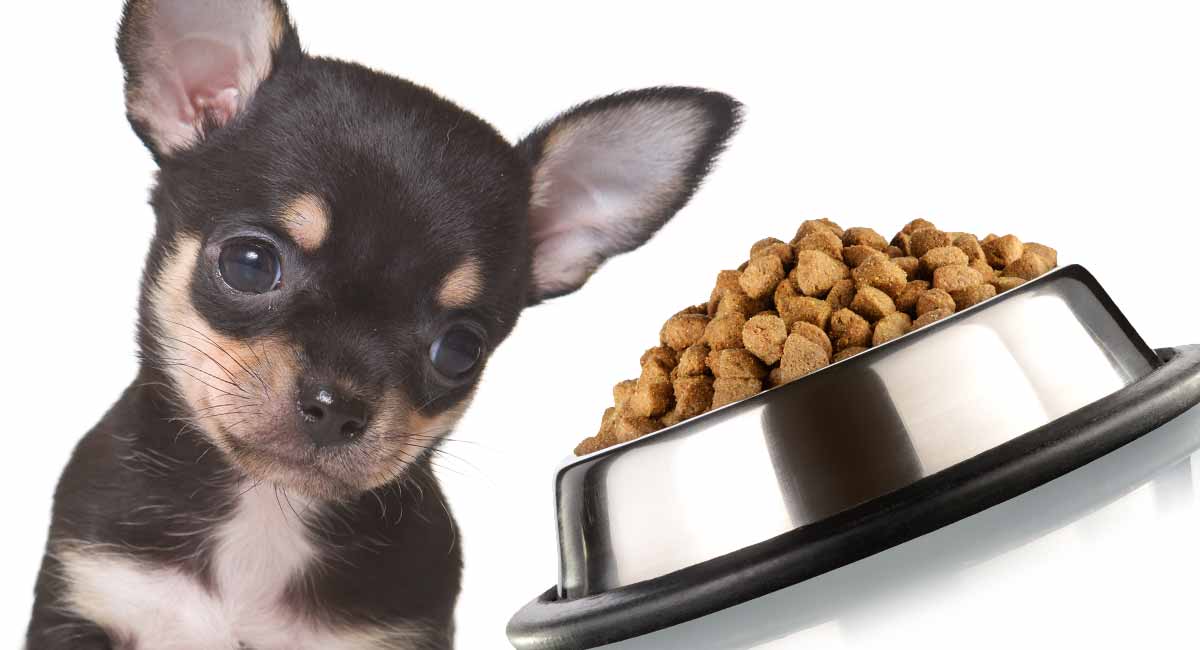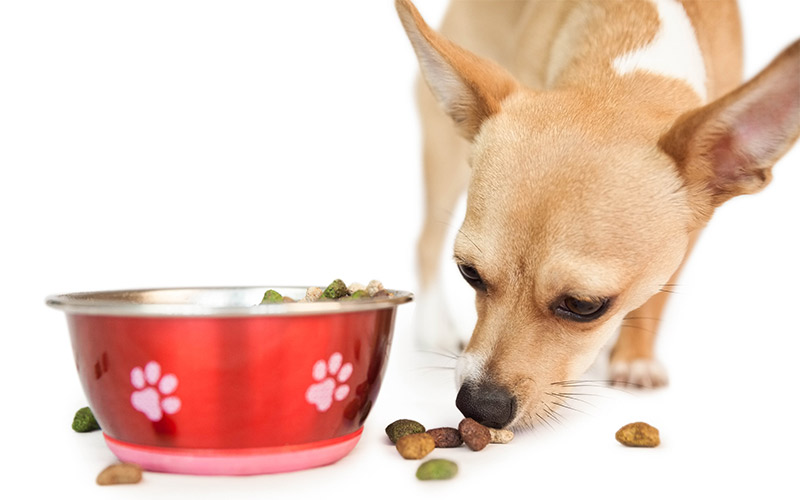Welcome to the world of Chihuahua puppy food, where every bite is a journey of nourishment and growth. These tiny companions deserve the best nutrition to support their energetic and adorable nature. Join us as we dive into the specifics of what, when, and how to feed your Chihuahua puppy, ensuring they thrive from their first nibble to adulthood.
From understanding their unique nutritional needs to navigating the maze of food options, this comprehensive guide will equip you with the knowledge to make informed decisions about your puppy’s diet. Get ready to unlock the secrets of Chihuahua puppy nutrition and watch your furry friend flourish.
Nutritional Requirements of Chihuahua Puppies

Chihuahua puppies have unique nutritional needs that must be met to ensure their healthy growth and development. Their small size and high metabolism require a diet that is rich in nutrients and calories.
Protein
Protein is essential for building and repairing tissues, and it is especially important for puppies who are growing rapidly. Chihuahua puppies should consume a diet that contains at least 25% protein.
Carbohydrates
Carbohydrates provide energy for puppies, and they are also important for the development of the brain and nervous system. Chihuahua puppies should consume a diet that contains at least 20% carbohydrates.
Fats
Fats are essential for the absorption of vitamins and minerals, and they also provide energy. Chihuahua puppies should consume a diet that contains at least 10% fat.
Daily Calorie Intake
The daily calorie intake for a Chihuahua puppy will vary depending on its age, weight, and activity level. However, a general guideline is to feed puppies around 200 calories per pound of body weight per day.
For example, a 2-pound Chihuahua puppy should consume around 400 calories per day.
Types of Chihuahua Puppy Food
Chihuahua puppies have specific nutritional requirements, and choosing the right type of food is essential for their health and well-being. There are three main types of Chihuahua puppy food available: wet food, dry food, and homemade diets.
Wet Food
Wet food is a convenient and palatable option for Chihuahua puppies. It is typically made with real meat, vegetables, and grains, and it contains a high moisture content. Wet food is easy to digest and is a good choice for puppies with sensitive stomachs.
However, it is also more expensive than dry food and can be messy to feed.
Dry Food
Dry food is a more economical option than wet food. It is made with a variety of ingredients, including meat, grains, and vegetables. Dry food is typically higher in calories than wet food, so it is important to feed your puppy the correct amount.
Dry food can be stored for longer periods of time than wet food, and it is less messy to feed.
Homemade Diets
Homemade diets can be a healthy and nutritious option for Chihuahua puppies. However, it is important to make sure that the diet is complete and balanced. Homemade diets can be time-consuming to prepare, and they may not be suitable for all puppies.
Ingredients to Look for in Chihuahua Puppy Food
When selecting Chihuahua puppy food, it is essential to consider the specific nutritional needs of this breed. Here are key ingredients to look for:
High-quality protein sources are crucial for Chihuahua puppies’ growth and development. Look for ingredients like chicken, lamb, or fish, which provide essential amino acids for muscle building and tissue repair.
Vitamins, Minerals, and Antioxidants, Chihuahua puppy food
Vitamins, minerals, and antioxidants are vital for the overall health and well-being of Chihuahua puppies. Ensure the food contains:
- Vitamin A for healthy vision and skin
- Vitamin C for immune system support
- Calcium and phosphorus for strong bones and teeth
- Antioxidants like vitamin E and selenium to protect against cell damage
Ingredients to Avoid in Chihuahua Puppy Food
Chihuahua puppies have unique nutritional needs, and certain ingredients in their food can be harmful. It’s crucial to be aware of these ingredients to ensure the health and well-being of your furry friend.
Below is a list of ingredients to avoid in Chihuahua puppy food, along with explanations of their potential risks:
Artificial Flavors and Colors
Artificial flavors and colors are often used to enhance the taste and appearance of pet food, but they offer no nutritional value and can be potentially harmful to your puppy.
Some artificial flavors may contain harmful chemicals that can irritate the digestive system and cause allergies.
Similarly, artificial colors may contain synthetic dyes that can be toxic to your puppy if ingested in large amounts.
Wheat, Corn, and Soy
These grains are common fillers in many pet foods, but they can be difficult for Chihuahua puppies to digest.
Wheat, corn, and soy can also be allergenic for some dogs, causing skin irritation, itching, and digestive upset.
By-Products
By-products are the non-meat parts of an animal that are used in pet food, such as organs, bones, and feathers.
While by-products can be a source of nutrients, they can also be low-quality and contain harmful substances, such as hormones and antibiotics.
Preservatives
Preservatives are added to pet food to extend its shelf life, but some of them can be harmful to your puppy.
For example, BHA (butylated hydroxyanisole) and BHT (butylated hydroxytoluene) are preservatives that have been linked to cancer in animals.
Examples of Ingredients to Watch Out For
- Artificial flavors: “Natural flavor,” “chicken flavor,” “beef flavor”
- Artificial colors: Blue 2, Red 40, Yellow 5
- Wheat: Wheat flour, wheat gluten, wheat bran
- Corn: Cornmeal, corn syrup, corn gluten
- Soy: Soy meal, soy protein concentrate
- By-products: Meat by-products, poultry by-products
- Preservatives: BHA, BHT
Feeding Guidelines for Chihuahua Puppies

Establishing proper feeding guidelines is crucial for the optimal growth and development of Chihuahua puppies. Understanding their unique nutritional needs and following recommended portion sizes are essential for maintaining a healthy weight and preventing obesity-related issues.
As a general rule, Chihuahua puppies should be fed a high-quality puppy food specifically formulated for small breeds. The frequency and amount of food should be adjusted based on the puppy’s age, weight, and activity level.
Feeding Frequency
Young Chihuahua puppies (up to 3 months old) require frequent feedings to support their rapid growth. They should be fed 3-4 times a day, with the last feeding no later than 9 pm. As they mature, the frequency of feedings can be gradually reduced to twice a day (morning and evening).
Portion Control
Determining the appropriate portion size for a Chihuahua puppy is essential to prevent overfeeding and weight gain. The recommended daily food intake for Chihuahua puppies is approximately 1/4 to 1/2 cup of dry food, divided into two meals. However, it’s important to monitor the puppy’s body condition and adjust the portion size as needed.
Transitioning to Adult Food

Transitioning Chihuahua puppies to adult food is an important step in their development. The ideal time to make this switch is when they are between 9 and 12 months old and have reached a weight of 5-6 pounds.To ensure a smooth transition, it is recommended to gradually introduce adult food into their diet over a period of 7-10 days.
Start by mixing 25% adult food with 75% puppy food. Gradually increase the proportion of adult food each day until they are fully transitioned to the new diet. This gradual approach helps prevent digestive upset and ensures that your puppy’s nutritional needs are met.
Monitoring Your Puppy’s Progress
During the transition period, it is important to monitor your puppy’s weight and body condition. If they are losing weight or not gaining weight as expected, adjust the feeding schedule or consult with your veterinarian. Additionally, pay attention to any changes in their stool or behavior, as these could indicate digestive issues.
Troubleshooting Common Feeding Issues
Ensuring proper nutrition for Chihuahua puppies is crucial for their health and well-being. However, some common feeding issues can arise, causing concern for pet owners. Understanding the potential causes and solutions for these issues is essential to address them effectively.
Diarrhea
- Potential Causes:Sudden dietary changes, food allergies, intestinal parasites, bacterial infections.
- Solutions:Gradually transition to new foods, eliminate potential allergens, seek veterinary attention for parasites or infections, provide bland diet (boiled chicken and rice).
Constipation
- Potential Causes:Dehydration, lack of fiber, intestinal obstruction.
- Solutions:Increase water intake, add fiber to the diet (pumpkin puree, cooked carrots), consult a veterinarian for potential obstructions.
Picky Eating
- Potential Causes:Food boredom, dental problems, stress, underlying health issues.
- Solutions:Offer variety in diet, check for dental discomfort, provide a calm and stress-free feeding environment, consult a veterinarian for medical conditions.
FAQ Section
What is the best type of food for Chihuahua puppies?
High-quality dry food specifically formulated for Chihuahua puppies is generally recommended. It provides a balanced blend of nutrients and promotes dental health.
How often should I feed my Chihuahua puppy?
Puppies under 12 weeks old should be fed 4-6 small meals per day. As they grow older, gradually reduce the frequency to 2-3 meals per day.
What should I avoid in Chihuahua puppy food?
Avoid foods high in fillers, artificial ingredients, and potential allergens like corn, wheat, and soy. Also, steer clear of foods containing harmful additives like BHA, BHT, and ethoxyquin.
